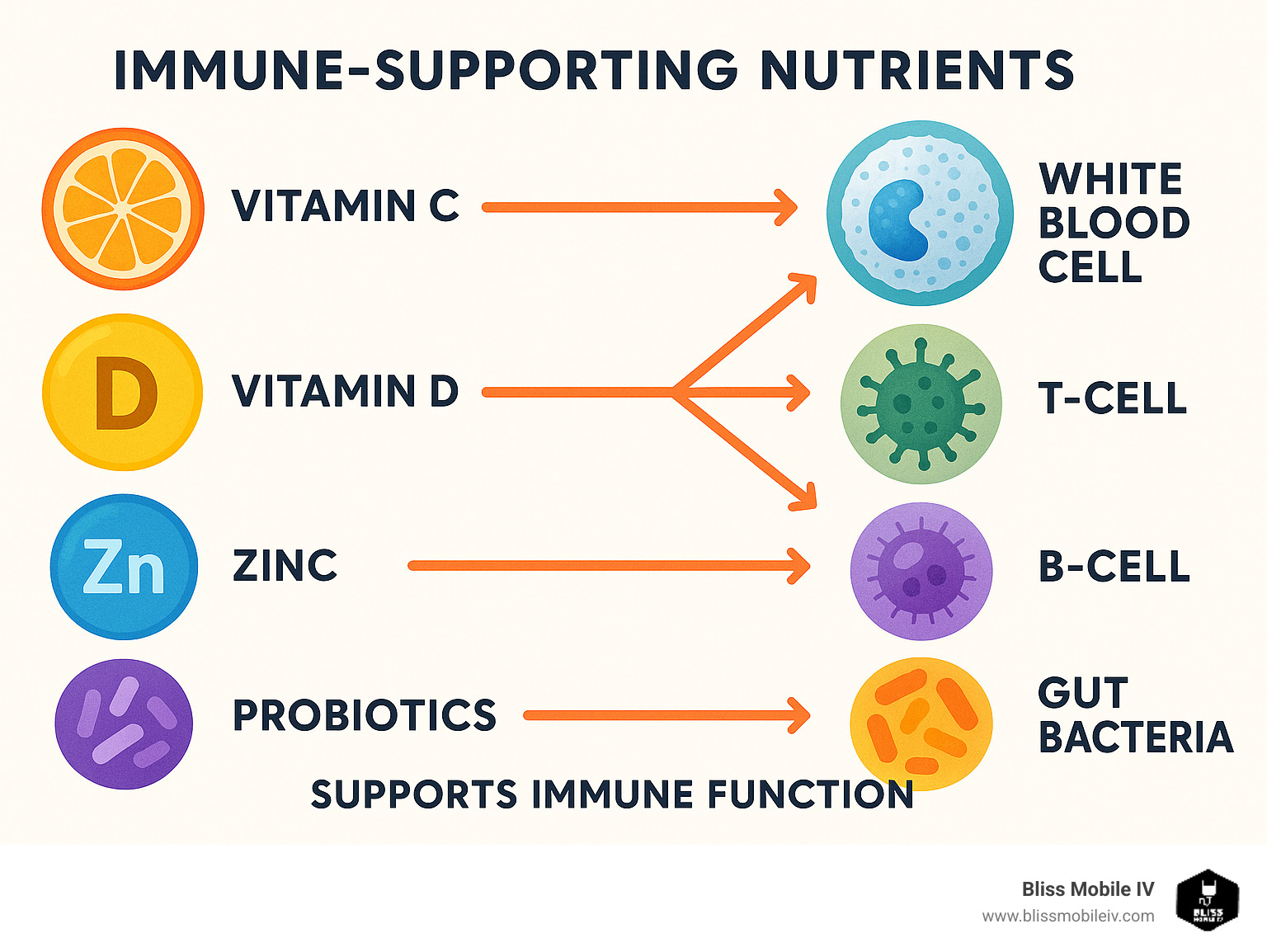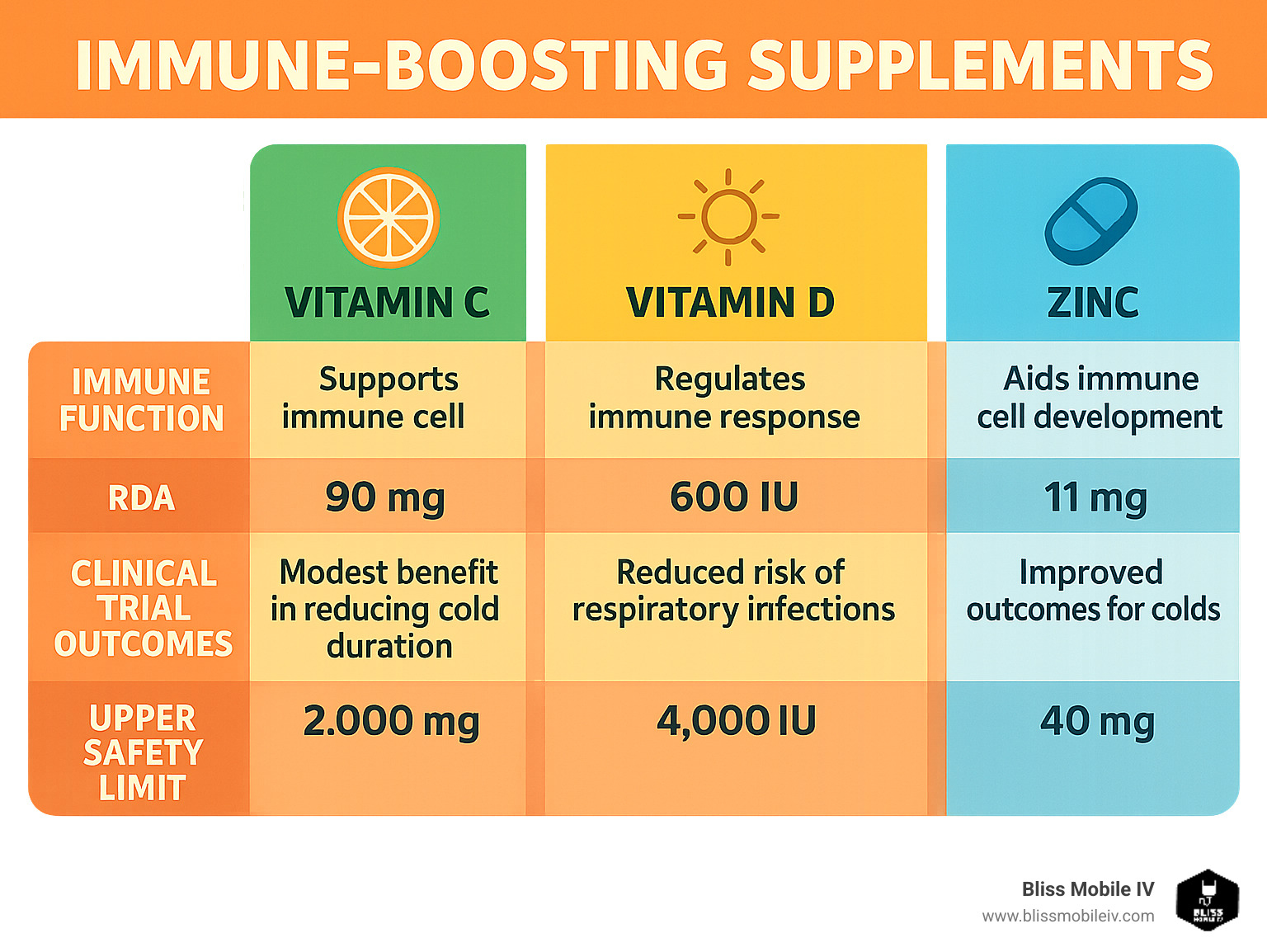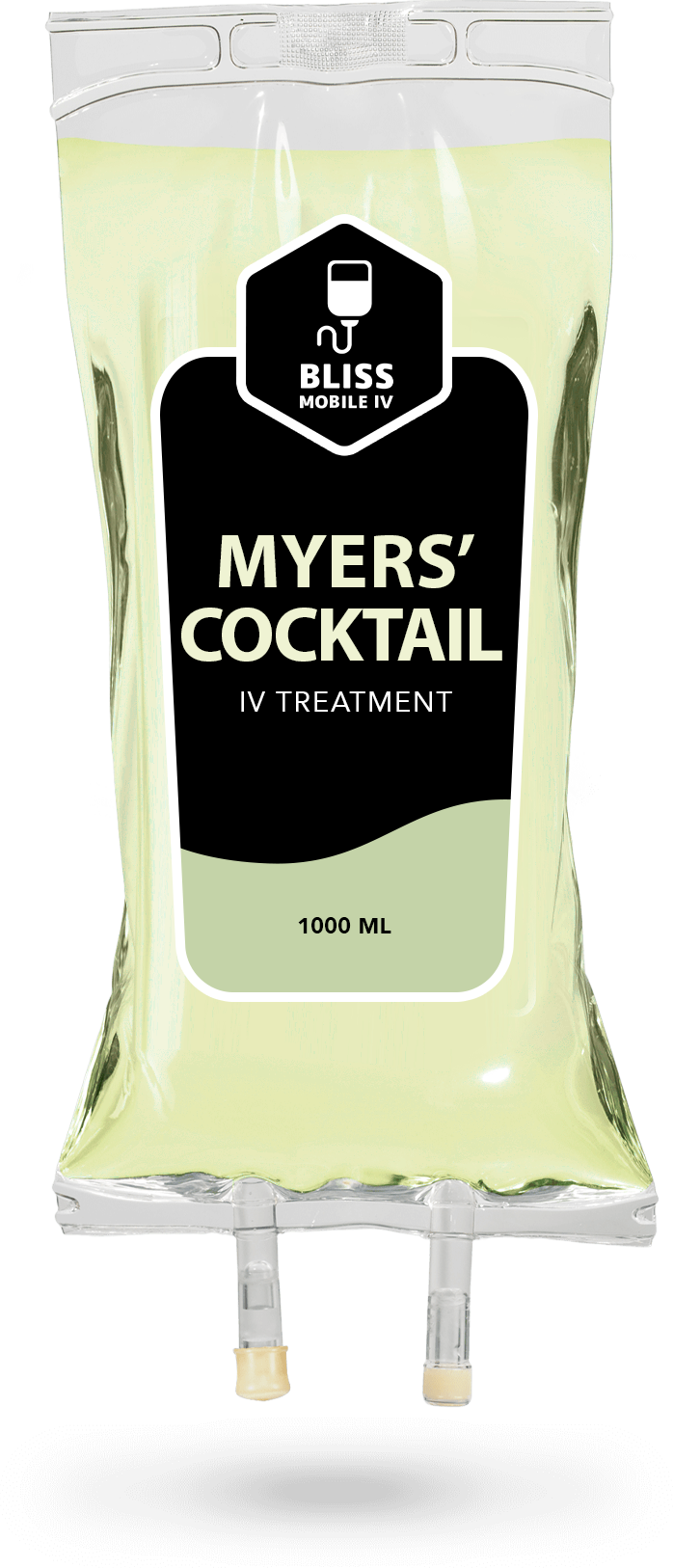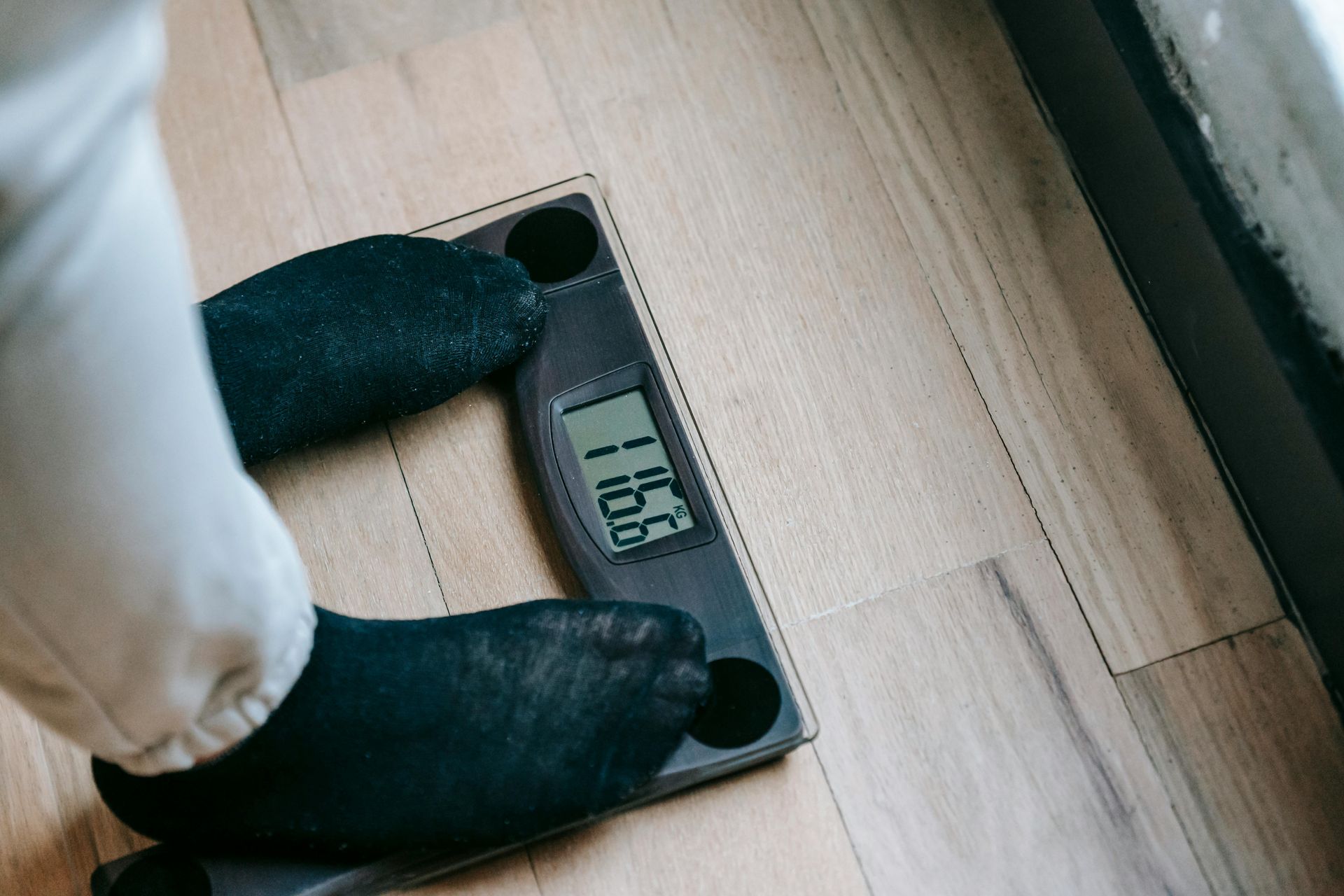Immune Boosting Supplements 101: What Actually Works?
What You Need to Know About Immune Boosting Supplements
Immune boosting supplements are among the most searched health topics, especially during cold and flu season. But with countless bottles lining pharmacy shelves and bold marketing claims everywhere, it's hard to know what actually works.
Quick Answer: What Actually Works?
- Vitamin C: Shortens cold duration by 8% in adults, 14% in children
- Vitamin D: Reduces respiratory infection risk by 12% overall
- Zinc: Deficiency affects 17% globally; supplementation helps if you're low
- Elderberry: Some evidence for reducing cold symptoms
- Most work ONLY if you have a deficiency- they don't "boost" immunity beyond normal levels
The truth is more nuanced than most supplement companies want you to believe. Most vitamins and minerals only help immune function if you have a deficiency- taking more doesn't provide additional benefits for people with adequate levels.
This guide cuts through the marketing hype to show you what science actually says about immune supplements. We'll cover which ones have real evidence, safe dosages, and when lifestyle changes might work better than pills.
Whether you're a busy professional trying to stay healthy during a hectic schedule or someone looking for convenient wellness solutions, you'll learn exactly which supplements are worth your time and money - and which ones to skip.

How Your Immune System Works (and Why It Matters)
Think of your immune system as your body's personal security team - part bouncer, part detective, and part memory expert all rolled into one. Understanding how this incredible system works helps explain why some immune boosting supplements actually help while others are just expensive wishful thinking.
Your immune system operates as a two-tier security system. Your innate immunity is like having an immediate response team always on duty. When trouble shows up, macrophages jump into action first - these cellular cleanup crews literally eat up invaders and debris. They release chemical messengers called cytokines that sound the alarm throughout your body, triggering inflammation to call for backup.
Your adaptive immunity includes T-cells, which act like military commanders coordinating attacks and remembering previous battles. B-cells are your antibody factories, producing proteins that lock onto specific germs. This memory system is why you typically only get chickenpox once.
Nutritional Building Blocks of Immunity
Your immune system needs specific raw materials to function properly. Protein provides the fundamental building blocks for antibodies and immune cells. Micronutrients like vitamins A, C, D, and E, plus minerals like zinc and selenium, serve as essential helpers in immune reactions. Antioxidants protect your immune cells during the inflammatory process.
The crucial insight is this: your immune system needs adequate nutrition to function normally, but more isn't always better. This is why understanding the difference between correcting deficiencies and truly "boosting" immunity matters when evaluating supplement claims.
Do Immune Boosting Supplements Really Work?
Here's the uncomfortable truth: the term "immune boosting" is actually misleading. You don't want to boost your immune system beyond its normal function - that could lead to autoimmune problems where your immune system attacks healthy tissue.
The research shows a clear pattern: immune boosting supplements work primarily by correcting deficiencies, not by supercharging an already healthy system. Clinical trials consistently show that supplements provide the most benefit when someone has a baseline deficiency. A comprehensive review found that vitamin D supplementation reduced respiratory infection risk by about 12% overall, but the effect was much stronger in people who were deficient to begin with.
When Supplements Make Sense
There are definitely situations where immune boosting supplements can provide real benefits:
Malabsorption issues from digestive disorders may prevent proper nutrient absorption from food alone. Restrictive diets often leave people short on key nutrients - vegans commonly need B12 and may benefit from zinc. Aging naturally affects both nutrient absorption and immune function. Pregnancy increases nutrient needs dramatically. Athletes under extreme physical stress burn through nutrients faster than average.
When They Don't (and Could Backfire)
Taking megadoses when you already have adequate levels won't provide extra protection and can sometimes make things worse. Nutrient interactions are surprisingly common - high doses of zinc can interfere with copper absorption, eventually impairing immune function. Toxicity from supplements is more common than you might think, and supplements can create a false sense of security while you ignore proven immune-supporting habits like adequate sleep and stress management.
Vitamins & Minerals With the Strongest Evidence
Let's cut through the marketing noise and look at what actually works. When it comes to immune boosting supplements, only a handful have solid research backing them up - and even then, the results might surprise you.
The three standouts are vitamin C, vitamin D, and zinc. These aren't miracle cures, but they do have legitimate science showing they can help your immune system function properly under certain circumstances.

Vitamin C for Colds & Beyond
Vitamin C is the granddaddy of immune boosting supplements- your grandmother probably swore by it, and she wasn't entirely wrong. But the real story is more nuanced than "take vitamin C to avoid getting sick."
Here's what vitamin C actually does for your immune system: it acts as a powerful antioxidant, protecting your white blood cells from damage while they're fighting off infections. Think of it as armor for your immune cells during battle. It also helps with the rapid turnover of immune cells, ensuring you have fresh reinforcements ready when needed.
The research tells an interesting story. Regular vitamin C supplementation doesn't prevent colds in most people, but it does shorten them by about 8% in adults and 14% in children. That might not sound like much, but it could mean bouncing back a day sooner from a week-long cold.
Where vitamin C really shines is during periods of extreme stress. Among marathon runners, soldiers training in harsh conditions, and others under severe physical stress, vitamin C supplementation cut cold risk in half. This suggests it's most valuable when your body is already under significant strain.
Dosage matters here. Most studies showing benefits use 250-1,000 mg daily - well above the 90 mg RDA for men and 75 mg for women. The upper safe limit is 2,000 mg daily. Going higher than this can cause stomach upset and diarrhea.
You can get plenty of vitamin C from food - a single orange provides about 70 mg, and bell peppers, strawberries, and broccoli are all excellent sources. But if you're under high stress or want that extra edge during cold season, supplementation can make sense.
Vitamin D & Respiratory Infections
Vitamin D has become something of a superstar in immune research, especially since the pandemic. Unlike vitamin C, which works mainly as an antioxidant, vitamin D actually helps program your immune system's response.
This "sunshine vitamin" improves how your white blood cells recognize and destroy pathogens. It also helps regulate inflammation - ensuring your immune system responds appropriately without going overboard and causing more harm than good.
The research is compelling: people who take vitamin D supplements regularly have about a 12% lower risk of respiratory infections overall. But here's the kicker - if you're deficient in vitamin D to start with, that protection jumps to 42%.
This is particularly relevant here in Utah, where our long winters and high altitude can severely limit sun exposure. Many of our clients across Salt Lake City, Weber County, and Cache County have suboptimal vitamin D levels, especially from November through March.
The tricky part with vitamin D is figuring out how much you need. The official RDA is 600-800 IU for most adults, but many experts recommend 1,000-4,000 IU daily, especially if you're not getting much sun. Since vitamin D is fat-soluble, it can build up in your system, so the upper limit of 4,000 IU daily is important to respect.
The best way to know if you need vitamin D is through a blood test measuring your 25(OH)D levels. Optimal levels are generally considered to be between 30-50 ng/mL.
Zinc for Viral Immunity
Zinc might be the most underappreciated player in immune health. This mineral is involved in over 100 enzyme reactions and is absolutely crucial for immune cell development and communication.
Here's what makes zinc special: it's essential for the barrier function of your skin and mucous membranes - your body's first line of defense against invaders. It also plays a key role in wound healing and helps immune cells communicate effectively with each other.
The numbers are striking: zinc deficiency affects about 17% of people worldwide and up to 30% of older adults. When zinc-deficient people take supplements, they see real improvements in immune function. This isn't about "boosting" immunity beyond normal - it's about restoring it to where it should be.
Zinc lozenges have shown particular promise for treating colds, but timing is everything. They work best when started within 24 hours of the first symptoms appearing. The zinc needs to come into direct contact with the virus in your throat and nasal passages.
The dosage sweet spot is important with zinc. The RDA is 8 mg for women and 11 mg for men, but therapeutic doses for cold treatment can go up to 40 mg daily - the upper safe limit. Taking more than this long-term can actually backfire by interfering with copper absorption and weakening your immune system.
Other Essential Micronutrients
Several other nutrients deserve mention for their immune-supporting roles, though the evidence isn't quite as strong as our top three.
Selenium acts as an antioxidant and helps regulate immune responses. Most Americans get enough from food (Brazil nuts are incredibly rich in selenium), but deficiency can significantly impair immune function.
Vitamin A is critical for maintaining the mucous membranes that serve as barriers against infection. It also supports T-cell function. Vitamin A deficiency is rare in developed countries, but when it occurs, it dramatically increases infection risk.
Vitamin E protects cell membranes from oxidative damage, but supplementation results have been mixed. Some studies in older adults actually showed worse outcomes with vitamin E supplements, highlighting that more isn't always better.
Iron, magnesium, and copper all play supporting roles in immune function, but deficiencies are relatively uncommon in well-nourished populations. Iron is particularly tricky because both deficiency and excess can impair immune function.
The takeaway? Focus on the big three - vitamin C, vitamin D, and zinc - especially if you have risk factors for deficiency. The others are important, but you're likely getting enough from a varied diet unless you have specific health conditions or dietary restrictions.
Herbal & Specialty Supplements: What the Research Shows
Beyond vitamins and minerals, herbal remedies and specialty supplements offer a fascinating landscape where traditional wisdom meets modern science. While the evidence can be more mixed than with basic vitamins, some natural approaches have genuinely compelling research behind them.

Elderberry, Echinacea & Garlic
Elderberry stands out as one of the most promising herbal immune boosting supplements with actual science backing it up. Black elderberry extract contains powerful flavonoids that appear to have genuine antiviral properties. Several studies suggest elderberry can reduce both the duration and severity of cold and flu symptoms, with one study finding people recovered about four days earlier than those taking a placebo.
Echinacea has mixed research results, but some trials show modest benefits for preventing or treating upper respiratory infections. The most promising research suggests certain preparations might reduce cold risk by about 10-20%.
Garlic contains compounds with genuine antimicrobial properties. One study found that people taking garlic supplements had 63% fewer colds than those taking a placebo, though garlic can cause digestive upset and interacts with blood-thinning medications.
Probiotics & Omega-3s
Probiotics represent one of the most exciting frontiers in immune support research. Your gut houses about 70% of your immune system, making gut health crucial for overall immune function. Multiple studies have found that certain probiotic strains can reduce the risk of respiratory infections.
Omega-3 fatty acids work as natural anti-inflammatory agents that help regulate immune responses, supporting strong responses when needed while preventing excessive inflammation that can cause harm.
Safe Use, Dosages & Drug Interactions
Taking immune boosting supplements safely requires understanding that "natural" doesn't automatically mean safe. Many herbs and high-dose vitamins can interact with medications or cause side effects.
Evidence-Based Dosage Guide
For most adults, effective dosages include: Vitamin C at 250-1,000 mg daily (studies show benefits in this range, with 2,000 mg daily as the upper safe limit). Vitamin D needs vary widely, but 1,000-4,000 IU daily is generally safe and effective. Zinc requires careful attention - 8-15 mg daily for maintenance, up to 40 mg short-term when fighting illness.
Children need completely different dosing- adult formulations can be dangerous for kids. Older adults often need higher doses due to absorption issues but are more sensitive to toxicity. Pregnant women should be especially cautious, as many immune supplements haven't been tested for safety during pregnancy.
Interactions You Need to Know
Zinc and antibiotics don't mix well - zinc can bind to certain antibiotics, making them less effective. Space them at least 2 hours apart. Garlic supplements can amplify blood-thinning medications, potentially increasing bleeding risk. Echinacea can interfere with medications processed by liver enzymes.
Who Should Talk to a Professional First?
Pregnant and breastfeeding women, people with autoimmune conditions, those taking immunosuppressive medications, children under 12, and anyone with chronic kidney or liver disease need professional guidance before starting supplements. When in doubt, ask - a quick conversation with your pharmacist or healthcare provider can prevent serious interactions.
Beyond Pills: Lifestyle Habits That Strengthen Immunity
Here's the truth supplement companies don't want you to hear: lifestyle factors often matter more than any pill you can take. The most effective immune support comes from good habits, not just immune boosting supplements.

Diet Diversity & Whole Foods
The Mediterranean diet and other patterns rich in colorful produce consistently show better immune outcomes than any single supplement. Eating a rainbow of fruits and vegetables provides a broader spectrum of immune-supporting compounds than any multivitamin. Fermented foods like yogurt and sauerkraut provide beneficial bacteria that support gut health and train your immune system.
Hydration & IV Support
Proper hydration is fundamental to immune function, helping transport nutrients to cells and maintain mucous membranes that defend against germs. Utah's dry climate makes staying hydrated challenging. Sometimes oral hydration isn't enough, especially when fighting illness or recovering from stress. IV vitamin therapy allows rapid repletion of fluids and nutrients, bypassing the digestive system entirely.
Sleep, Stress & Movement
Quality sleep for 7-9 hours isn't just about feeling rested - during deep sleep, your body produces infection-fighting cells and antibodies. Stress management is crucial because chronic stress suppresses immune function. Moderate exercise acts like a tune-up for your immune system, increasing antibody production and helping flush bacteria from airways.
These lifestyle factors work synergistically, creating a positive cycle that no amount of immune boosting supplements can replicate alone.
Frequently Asked Questions about Immune Boosting Supplements
Do I need supplements if I eat a balanced diet?
If you're eating a truly varied diet with plenty of fruits, vegetables, and quality proteins, you're probably getting most nutrients you need. However, certain situations create gaps: Utah's long winters mean many people don't get adequate sun for vitamin D production. Vegetarian diets may need B12, iron, and zinc attention. Pregnancy increases folate and iron needs significantly. Chronic digestive issues can impair absorption even from perfect diets.
Can high-dose vitamin C prevent COVID-19?
There's no evidence that high-dose vitamin C prevents COVID-19 in healthy people. While vitamin C supports immune function, megadoses won't create protective shields against viruses. Hospital studies with critically ill patients are completely different from healthy people taking oral supplements for prevention. The most effective prevention remains vaccination, good hygiene, and maintaining overall health.
Are immune gummy vitamins safe for kids?
Gummy vitamins formulated for children can be safe when used properly, but watch for added sugars and ensure age-appropriate dosing. Iron-containing gummies are particularly concerning due to overdose risk. Store all vitamins safely out of reach. Gummies shouldn't substitute for building healthy eating habits - work with your pediatrician to identify real nutritional gaps before starting supplements.
Conclusion & Next Steps
Here's the truth about immune boosting supplements that cuts through all the marketing noise: they're not magic bullets, but they're not useless either. The key is understanding when they actually make a difference.
What we've learned is that most supplements work like filling a car's gas tank - they only help when you're running low. If your tank is already full, adding more won't make you go faster. The same principle applies to your immune system.
Vitamin C does shorten cold duration by about 8%, especially if you're under stress. Vitamin D becomes crucial during Utah's long winters when sun exposure is limited. Zinc can genuinely help, but only if you're among the 17% of people who are deficient. Elderberry shows promise for cold relief, and probiotics support that all-important gut-immune connection.
But here's what really matters: sleep, stress management, regular movement, and eating a variety of whole foods consistently outperform any supplement you can buy. These aren't just feel-good recommendations - they're backed by decades of research showing that lifestyle factors are your immune system's best friends.
So where do you go from here? Start with the basics. Prioritize 7-9 hours of quality sleep- your immune cells literally recharge during rest. Find ways to manage stress that work for your lifestyle, whether that's morning walks, meditation, or just taking a few deep breaths during busy days. Eat the rainbow- different colored fruits and vegetables provide different immune-supporting compounds that no single pill can match.
Consider targeted supplementation if you have specific risk factors. Living in Utah means vitamin D is worth discussing with your healthcare provider. If you're vegetarian, zinc and B12 might be helpful. If you're over 65, your nutrient needs change, and absorption can become less efficient.
Consult with healthcare professionals when you're unsure. This is especially important if you're pregnant, have chronic health conditions, or take medications that might interact with supplements.
Sometimes, though, your body needs more support than oral supplements can provide. This is where Bliss Mobile IV's convenient on-site nutrient infusions can complement a balanced lifestyle approach. When you're recovering from illness, preparing for a demanding period, or dealing with Utah's dehydrating climate, our mobile service brings rapid rehydration and targeted nutrition directly to you.
Whether you're in Salt Lake City dealing with inversion air quality, in Weber County managing a busy work schedule, or anywhere across Utah juggling family and career demands, we understand that optimal wellness sometimes requires personalized support. Our treatments are designed to work alongside - not replace - healthy lifestyle habits.
The bottom line? There's no substitute for taking care of yourself consistently. But when you need that extra support, whether it's a quality supplement for a specific deficiency or professional IV therapy for rapid nutrient replenishment, the right approach can help you maintain the energy and resilience you need to thrive.
Your immune system has been keeping you healthy long before supplements existed. Give it the basics it needs - good sleep, manageable stress, regular movement, and quality nutrition - and it will continue to serve you well. Everything else is just fine-tuning.









